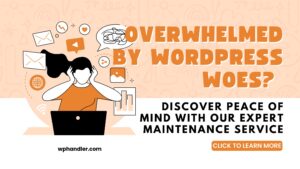Back Up Your Website Regularly
The Importance of Backups
Listen, I’ve been there—spending hours crafting the perfect blog post, only to lose it all to a pesky server crash or a sneaky hacker. That’s why backing up your website is number one on my checklist. Regular backups give you peace of mind that your content is safe, no matter what happens. If you’re not backing up your site, you’re playing with fire.
Backups should be automated whenever possible. There are a ton of plugins that can do this for you. I recommend solutions like UpdraftPlus or BackupBuddy because they make the whole process seamless. Just set it and forget it, you know?
Now, don’t just keep your backups on your server. Store them securely in places like Google Drive or Dropbox. Having multiple off-site storage options means you’ll be ready if disaster strikes.
Update Themes and Plugins Regularly
<h3:Why Updating is Critical
Trust me on this: outdated themes and plugins can be a gateway for hackers. Each time a new version is released, it usually comes with security fixes along with new features. So, keep your eyes peeled for those notifications in your WordPress dashboard. Ignoring them could lead to vulnerabilities.
Setting up a routine of checking and updating once a week has saved me a ton of headaches. I pop into the admin panel, see what needs to be updated, and knock it out in a few minutes. It’s super quick and minimizes risks.
Also, don’t forget that deprecated themes and plugins can hamper your site’s performance. If a plugin hasn’t been updated in over six months, it’s worth considering a replacement. There are always alternatives out there that are actively maintained.
Optimize Database for Performance
<h3:Why Database Optimization Matters
Your WordPress database holds all your content, comments, and settings. Over time, it can become cluttered with post revisions, spam comments, and expired transients, which slow your site down. I can’t stress enough how important it is to keep your database optimized for better performance.
I swear by plugins like WP-Optimize that handle this effortlessly. They clean up unnecessary data like a pro, and the result is a faster, more responsive site. Not only that, it’s beneficial for SEO since search engines favor speedy websites.
Just remember, never forget to back up your database before optimization. Because if something goes wrong (it happens), you want to be ready to restore everything back to normal without losing anything important.
Monitor Website Uptime
<h3:Using Tools for Uptime Monitoring
Uptime is critical for any online presence. If your site goes down, not only will you lose visitors, but your credibility might take a hit too. To keep tabs on your site’s uptime, use monitoring tools like Uptime Robot. It gives you peace of mind by alerting you if your site is down.
Setting up these tools is a piece of cake. Once installed, they check your site every few minutes—so you’re instantly notified if something’s off. Trust me, getting those alerts means you can act fast instead of losing business.
Also, consider investing in quality hosting. Some web hosts offer built-in uptime monitoring services. It’s worth your while; good hosting can save you a ton of trouble later on!
Implement Security Measures
<h3:Why Security Should Never be Overlooked
WordPress is a popular platform, making it a target for hackers. It’s so crucial to implement strong security measures. For me, this means using a solid security plugin like Wordfence or Sucuri to monitor threats and prevent breaches.
Multi-factor authentication is another must-have. Adding an extra layer of security ensures that only you can access your site. It might take a few extra seconds to log in, but it’s well worth it.
Additionally, keep an eye out for suspicious activity. Your security plugin can help you track logins and any abnormal behavior. If something smells fishy, you’ll want to know about it ASAP!
FAQ
1. How often should I back up my WordPress site?
Ideally, you should back up your site at least once a week, or even daily if you’re making significant changes or adding new content regularly.
2. What are some reliable plugins for updating themes and plugins?
I recommend using WP Update Notifier for keeping you updated or even setting your updates to automatic where it makes sense, but always check after an update for compatibility!
3. Can database optimization affect my website’s SEO?
Absolutely! A well-optimized database means faster load times, which search engines love. It can improve your rankings and enhance user experience.
4. What should I do if my website goes down?
First, check your uptime monitoring tool for alerts. Then contact your hosting provider for assistance. Having a backup helps so you can restore your site quickly.
5. Is it necessary to use a security plugin?
Yes, it’s highly recommended! Security plugins monitor threats and provide protection that you might not be able to manage on your own.

